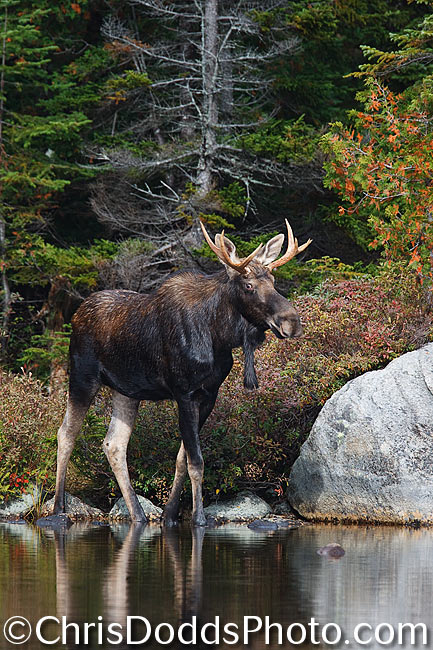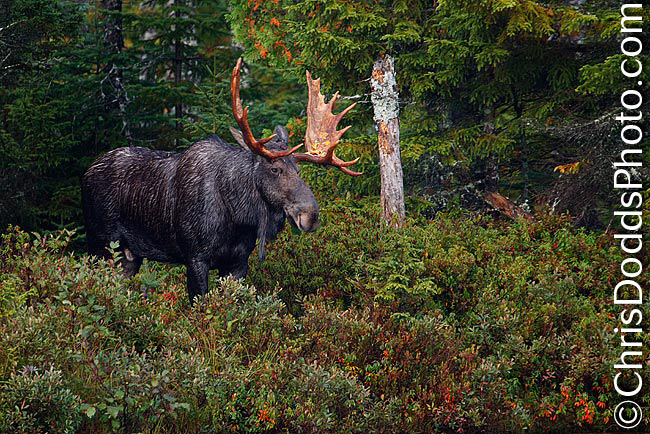 Bull Moose Vertical (Alces, Elan, Orignal) Baxter State Park, Maine ©Christopher Dodds www.chrisdoddsphoto.com All Rights Reserved. Canon EOS 1DsMKIII, 500mm F4 and 1.4XII tele-converter Gitzo 1325 Tripod and Wimberley Head II. ISO 500, F5.6 1/200s Manual.
Bull Moose Vertical (Alces, Elan, Orignal) Baxter State Park, Maine ©Christopher Dodds www.chrisdoddsphoto.com All Rights Reserved. Canon EOS 1DsMKIII, 500mm F4 and 1.4XII tele-converter Gitzo 1325 Tripod and Wimberley Head II. ISO 500, F5.6 1/200s Manual.
As mentioned in earlier posts, this years trip to Baxter State Park in Maine was one of my most productive. Here's just a few of the 13 Moose we spent time photographing. It's always a thrill to get close, and close we got on a few occasions; It's best to let Moose come to you, rather than go off chasing them around the forest & remember that Bull Moose that are about two and a half years old (like the Moose in the photo above) are the most unpredictable and therefore the most dangerous; If you find yourself feeling a little uncomfortable, then slowly move away. Moose of this age are starting to "feel their oats" for the first time, and unsure of how to behave during this time of hormonal change.
 Bull Moose Giant of the Northwoods (Alces, Elan, Orignal) Baxter State Park, Maine ©Christopher Dodds www.chrisdoddsphoto.com All Rights Reserved. Canon EOS 1DsMKIII, 500mm F4 and 2XII tele-converter Gitzo 1325 Tripod and Wimberley Head II. ISO 400, F8 1/160s Manual.
Bull Moose Giant of the Northwoods (Alces, Elan, Orignal) Baxter State Park, Maine ©Christopher Dodds www.chrisdoddsphoto.com All Rights Reserved. Canon EOS 1DsMKIII, 500mm F4 and 2XII tele-converter Gitzo 1325 Tripod and Wimberley Head II. ISO 400, F8 1/160s Manual.
Named from the Algonquin term meaning "twig-eater", Moose rely most on their strongest senses: Hearing and smell. Their vision isn't the best, but with the placement of their eyes they can see almost 360°. Inhabiting dense forests throughout Canada, Maine and Alaska, Moose (Alces alces) are the giants of the deer family. They may lack the grace of other deer, but they are among North America's most magnificent mammals. A bull moose crashing through the underbrush in a northern bog is a sight not soon forgotten.
Alaska boasts the largest males: they weigh some 1,800 pounds, stand seven feet tall at the shoulder, and have antlers with a spread of over six feet. In addition to a massive body and a big, overhanging muzzle, the moose is characterized by a fold of skin on the throat (its function unknown) called the "bell" or "Dewlap". You may be able to distinguish particular moose by their distinctive dewlaps. Though long and spindly-looking, its legs are well suited for moving swiftly across snow, wading in water, and swimming.
During the fall rutting season, when their low, mooing calls echo through the forest, bulls battle over cows in savage antler-to-antler confrontations. By December the contests end and the bulls shed their hefty headgear.
In summer, moose wade into ponds and streams to eat aquatic plants, and in winter they browse on twigs and bark. Once exterminated in parts of their range- they were used as food by native peoples and early settlers, and their antlers have always been prized as trophies- moose have lately made quite a comeback.
 Bull Moose Vertical Portrait (Alces, Elan, Orignal) Baxter State Park, Maine ©Christopher Dodds www.chrisdoddsphoto.com All Rights Reserved. Canon EOS 1DsMKIII, 500mm F4 and 2XII tele-converter Gitzo 1325 Tripod and Wimberley Head II. ISO 400, F8 1/125s Manual.
Bull Moose Vertical Portrait (Alces, Elan, Orignal) Baxter State Park, Maine ©Christopher Dodds www.chrisdoddsphoto.com All Rights Reserved. Canon EOS 1DsMKIII, 500mm F4 and 2XII tele-converter Gitzo 1325 Tripod and Wimberley Head II. ISO 400, F8 1/125s Manual.
Do consider joining me for the Moose and fall colors of Maine Workshop next year.
Comments welcome & appreciated.



